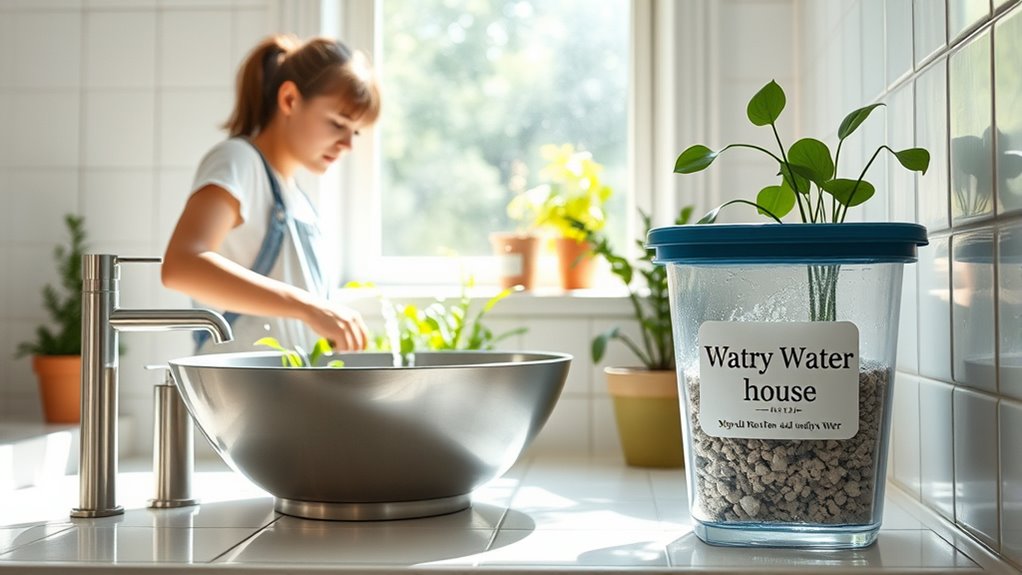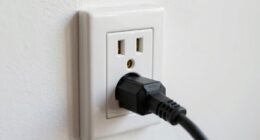To conserve water at home, start by practicing simple habits like taking shorter showers and turning off taps when not in use. Consider installing rainwater harvesting systems to collect rainwater for gardening and cleaning. Greywater recycling allows you to reuse water from sinks, showers, and laundry for outdoor irrigation. Maintaining these systems guarantees their effectiveness and maximizes savings. Keep exploring these techniques to discover more ways to reduce water waste and protect natural resources effectively.
Key Takeaways
- Implement rainwater harvesting systems to collect and store rainwater for outdoor and indoor use.
- Reuse greywater from sinks, showers, and laundry for irrigation and landscape watering.
- Use water-efficient fixtures like low-flow faucets, showerheads, and dual-flush toilets to reduce water consumption.
- Practice mindful water habits, such as shorter showers and turning off taps when not in use.
- Regularly maintain and clean water systems to ensure optimal performance and long-term savings.

Have you ever wondered how your everyday habits impact water conservation? Small changes in your routine can make a big difference, especially when it comes to reducing water waste at home. One effective way to do this is by implementing rainwater harvesting and greywater recycling. These methods allow you to reuse water, lessen your reliance on municipal supplies, and help protect the environment.
Rainwater harvesting is straightforward and highly effective. When it rains, you can collect water from your roof using a simple system of gutters and storage tanks. This water can then be used for watering plants, cleaning, or even flushing toilets if properly filtered. Not only does this reduce your dependence on tap water, but it also minimizes runoff that could carry pollutants into local waterways. By capturing rainwater, you’re taking an active role in conserving water and decreasing your utility bills. Plus, it’s a sustainable practice that makes good use of natural resources often wasted during storms. Incorporating rainwater collection systems can further enhance your water-saving efforts. Additionally, understanding how to maintain these systems ensures their effectiveness over time.
Collect rainwater from your roof to reduce dependence on tap water and prevent runoff pollution.
Greywater recycling is another powerful technique. It involves reusing water from sinks, showers, and laundry that would otherwise go directly into the sewer system. Instead of letting this water go to waste, you can divert it to irrigate your garden or landscape. For example, greywater systems filter and treat this water, making it safe for plants and reducing the need for fresh water. This practice not only conserves water but also lessens the load on your local sewage system. Installing a greywater system might sound complex, but many simple solutions are available that fit different household needs. Additionally, water reuse can significantly reduce your household’s overall water footprint. Using efficient plumbing fixtures can further decrease your water consumption and maximize the benefits of greywater systems.
Both rainwater harvesting and greywater recycling require some initial setup, but the long-term benefits outweigh the effort. They turn what would be waste into a valuable resource, helping you become more self-sufficient and environmentally conscious. When you adopt these practices, you actively participate in water conservation efforts, which are vital as water scarcity becomes an increasing concern worldwide. You might find that these methods also encourage you to be more mindful of your water use overall—like taking shorter showers or turning off taps when not in use.
In addition, incorporating efficient general ledger coding can help households and businesses track water expenses more accurately, promoting better resource management.
In the end, conserving water at home isn’t just about saving money; it’s about making smarter choices for the planet. By collecting rainwater and recycling greywater, you’re doing your part to reduce strain on local water supplies and protect natural resources. These techniques empower you to take control of your water usage, ensuring that sustainable practices become a natural part of your daily life.
Frequently Asked Questions
How Can I Detect Hidden Leaks in My Plumbing System?
When you’re trying to detect hidden leaks in your plumbing system, start with leak detection techniques like listening for hissing sounds or watching for unexplained water bills. Conduct a pipe inspection by checking for damp spots, mold, or discoloration around fittings and walls. Turn off appliances and observe the water meter; if it still moves, you likely have a leak. Regular pipe inspections help catch issues early, saving water and preventing damage.
What Are the Best Low-Flow Appliances for My Home?
Imagine transforming your home into a water-saving haven. The best low-flow appliances, like water-efficient fixtures and greywater recycling systems, make this possible. These devices reduce water use without sacrificing performance, helping you save money and protect the environment. With sleek designs and innovative technology, you’ll enjoy a more sustainable lifestyle. Don’t wait—upgrade your appliances now and reveal the secrets to conserving every drop of water effortlessly.
How Do I Compost Greywater Safely?
To compost greywater safely, you need proper greywater treatment and effective composting methods. First, divert greywater from sinks and showers into a compost-friendly area, avoiding toilets or kitchen sinks. Use biological filters or natural soil beds for greywater treatment, which neutralizes contaminants. Incorporate organic composting methods, such as layered compost piles, to break down greywater residues safely. Always guarantee the greywater is free from harmful chemicals before reuse.
Can Rainwater Harvesting Be Implemented in Small Urban Spaces?
Think outside the box and yes, you can implement rainwater harvesting in small urban spaces. Urban rooftop rain collection is a smart move, and you can use compact rainwater storage solutions that fit your limited space. It’s like killing two birds with one stone—saving water and reducing runoff. With some planning, you’ll turn your small balcony or rooftop into a water-saving oasis, making the most of every drop.
What Are the Legal Regulations for Water Reuse in Residential Areas?
You need to understand water rights and licensing procedures to reuse water legally in residential areas. Regulations vary by location, so check your local laws to guarantee compliance. You might be required to obtain permits or licenses before implementing water reuse systems. Staying informed about these legal regulations helps you avoid penalties and promotes responsible water use. Always consult local authorities to clarify specific rules and procedures before starting your water reuse projects.
Conclusion
By implementing these simple water-saving techniques, you’ve taken a vital step toward a greener home. But the real question is, how much more can you do before it’s too late? Every drop saved counts, yet the future depends on what you choose to do next. Will you open even greater ways to conserve water and make a lasting impact? The choice is yours—your actions today could shape a more sustainable tomorrow.









